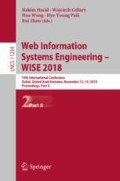Abstract
Research challenges for Smart Cities concern the study of methods and techniques to help citizens and administrators to effectively obtain information of interest from the large amounts of data in multiple, heterogeneous sources. Accessing heterogeneous data sources and aggregating urban data according to several perspectives can be achieved by defining proper indicators. In addition, semantic web technologies may be used to enable interoperability and improve data access. In this paper, we propose an ontology-based framework to support personalised urban data exploration. The framework is composed of: (i) the so-called Smart Living Ontology, providing a semantic representation of city indicators; (ii) a Semantic Layer, exploiting the ontology and user characterisation to enable personalised access to urban data.
Access this chapter
Tax calculation will be finalised at checkout
Purchases are for personal use only
Notes
- 1.
The TBox of the ontology can be found at https://tinyurl.com/onto-schema (a free Web Protégé account is required).
- 2.
- 3.
- 4.
- 5.
http://purl.org/linked-data/cube (“qb:” is the ontology prefix).
- 6.
http://schema.org/ (“schema:” is the ontology prefix).
- 7.
http://www.w3.org/2006/time (“time:” is the ontology prefix).
- 8.
References
The GrowSmarter project. http://www.grow-smarter.eu/home/
OPTIMising the energy USe in cities with smart decision support systems. http://optimus-smartcity.eu/
The Res Novae project. http://resnovae-unical.eu
The San Francisco Park project. http://sfpark.org
The BESOS project. Building Energy decision Support systems for Smart cities. http://besos-project.eu
The ROMA project. Resilience enhancement of a Metropolitan Area. http://www.progetto-roma.org
Bellini, P., Benigni, M., Billero, R., Nesi, P., Rauch, N.: Km4city ontology building vs data harvesting and cleaning for smart-city services. J. Vis. Lang. Comput. 25(6), 827–839 (2014)
Brizzi, P., Bonino, D., Musetti, A., Krylovskiy, A., Patti, E., Axling, M.: Towards an ontology driven approach for systems interoperability and energy management in the smart city. In: International Conference on Computer and Energy Science (SpliTech), pp. 1–7 (2016)
Chauhan, S., Agarwal, N., Kar, A.: Addressing big data challenges in smart cities: a systematic literature review. Info 18(4), 73–90 (2016)
Fox, M.S.: PolisGnosis project: representing and analysing city indicators. In: Enterprise Integration Laboratory, University of Toronto Working paper (2015)
ISO: Sustainable development of communities - Indicators for city services and quality of life. Standard, International Organization for Standardization (2014)
Komninos, N., Bratsas, C., Kakderi, C., Tsarchopoulos, P.: Smart city ontologies: improving the effectiveness of smart city applications. J. Smart Cities 1(1), 1–16 (2015)
Lanza, J., et al.: Managing large amount of data generated by a smart city internet of things deployment. Int. J. Semant. Web Inf. Syst. 12(4), 22–42 (2016)
Lopez, V., Stephenson, M., Kotoulas, S., Tommasi, P.: Data access linking and integration with DALI: building a safety net for an ocean of city data. In: Arenas, M., et al. (eds.) ISWC 2015. LNCS, vol. 9367, pp. 186–202. Springer, Cham (2015). https://doi.org/10.1007/978-3-319-25010-6_11
Psyllidis, A.: Ontology-based data integration from heterogeneous urban systems: a knowledge representation framework for smart cities. In: Proceedings of the 14th International Conference on Computers in Urban Planning and Urban Management (2015)
Rani, M., Alekh, S., Bhardwaj, A., Gupta, A., Vyas, O.P.: Ontology-based classification and analysis of non-emergency smart-city events. In: 2016 International Conference on Computational Techniques in Information and Communication Technologies (ICCTICT), pp. 509–514 (2016)
Rossello-Busquet, A., Brewka, L.J., Soler, J., Dittmann, L.: Owl ontologies and SWRL rules applied to energy management. In: 2011 UkSim 13th International Conference on Computer Modelling and Simulation, pp. 446–450 (2011)
Royo, J.A., Mena, E., Bernad, J., Illarramendi, A.: Searching the web: from keywords to semantic queries. In: Third International Conference on Information Technology and Applications (ICITA 2005), pp. 244–249 (2005)
Santos, H., Dantas, V., Furtado, V., Pinheiro, P., McGuinness, D.L.: From data to city indicators: a knowledge graph for supporting automatic generation of dashboards. In: Blomqvist, E., Maynard, D., Gangemi, A., Hoekstra, R., Hitzler, P., Hartig, O. (eds.) ESWC 2017. LNCS, vol. 10250, pp. 94–108. Springer, Cham (2017). https://doi.org/10.1007/978-3-319-58451-5_7
Tomašević, N.M., Batić, M.Č., Blanes, L.M., Keane, M.M., Vraneš, S.: Ontology-based facility data model for energy management. Adv. Eng. Inform. 29(4), 971–984 (2015)
Acknowledgments
The BSL consortium is leaded by A2A and includes as partners: Beretta Group, Cauto, Cavagna Group, the Municipality of Brescia, University of Brescia, Enea, STMicroelectronics and an association of private companies (for more information, https://www.bresciasmartliving.eu/).
Author information
Authors and Affiliations
Corresponding author
Editor information
Editors and Affiliations
Rights and permissions
Copyright information
© 2018 Springer Nature Switzerland AG
About this paper
Cite this paper
Bianchini, D., De Antonellis, V., Garda, M., Melchiori, M. (2018). Semantics-Enabled Personalised Urban Data Exploration. In: Hacid, H., Cellary, W., Wang, H., Paik, HY., Zhou, R. (eds) Web Information Systems Engineering – WISE 2018. WISE 2018. Lecture Notes in Computer Science(), vol 11234. Springer, Cham. https://doi.org/10.1007/978-3-030-02925-8_26
Download citation
DOI: https://doi.org/10.1007/978-3-030-02925-8_26
Published:
Publisher Name: Springer, Cham
Print ISBN: 978-3-030-02924-1
Online ISBN: 978-3-030-02925-8
eBook Packages: Computer ScienceComputer Science (R0)

